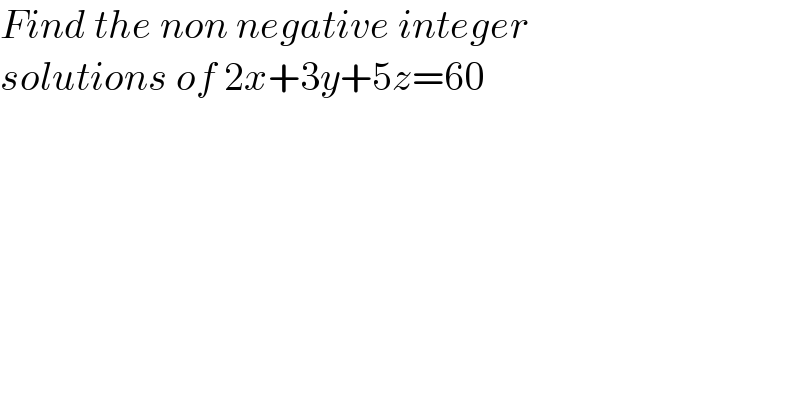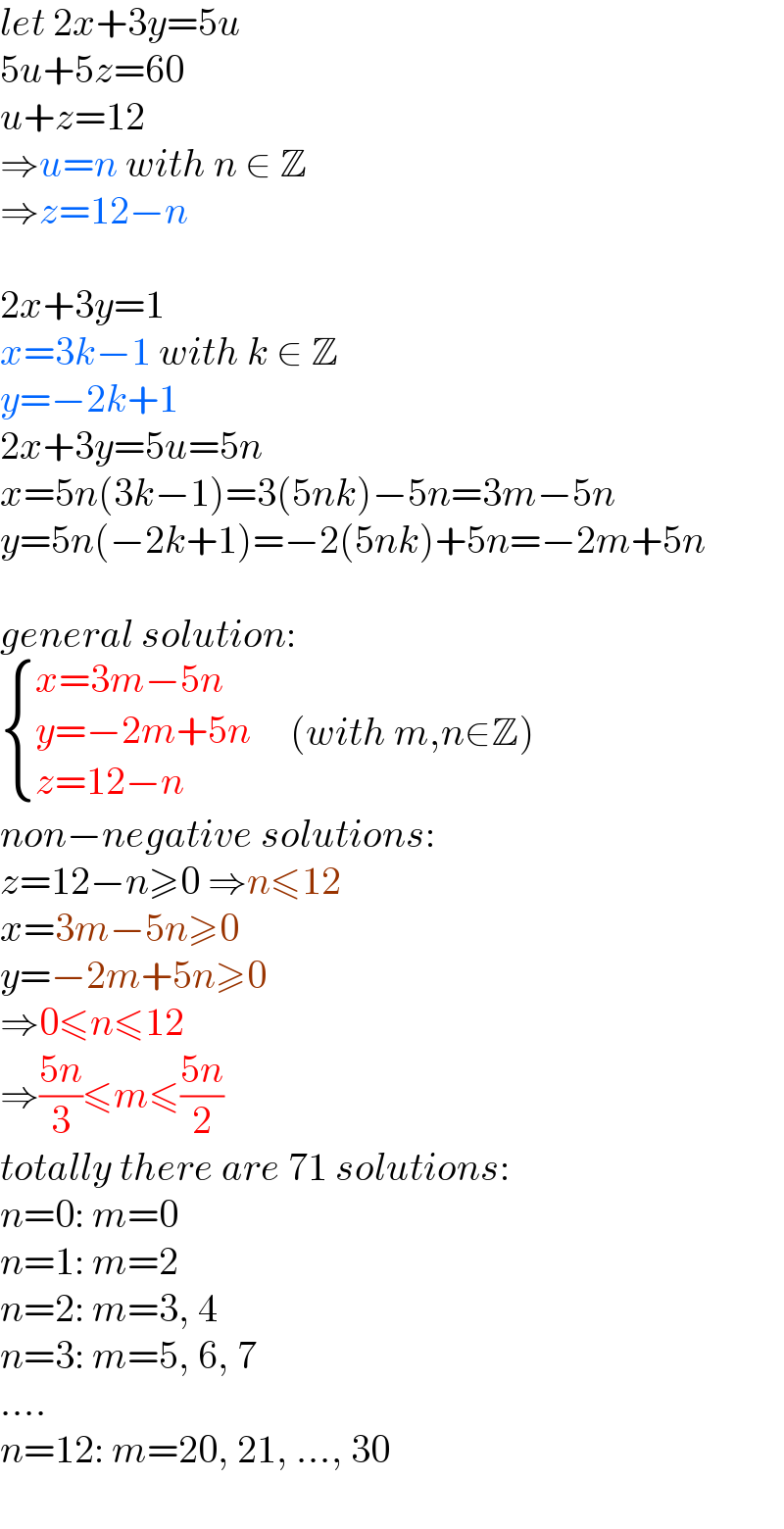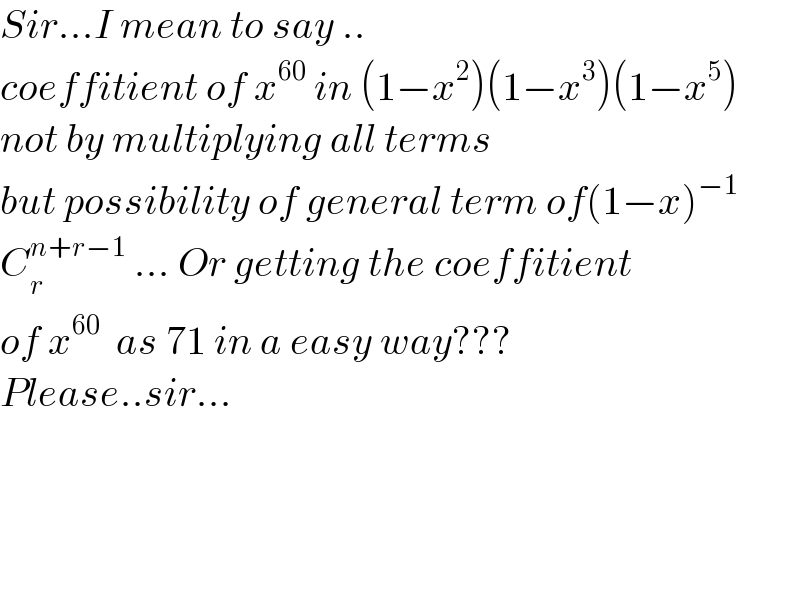
Previous in Permutation and Combination Next in Permutation and Combination
Question Number 163313 by SLVR last updated on 06/Jan/22

$${Find}\:{the}\:{non}\:{negative}\:{integer} \\ $$$${solutions}\:{of}\:\mathrm{2}{x}+\mathrm{3}{y}+\mathrm{5}{z}=\mathrm{60} \\ $$
Answered by mr W last updated on 06/Jan/22

$${let}\:\mathrm{2}{x}+\mathrm{3}{y}=\mathrm{5}{u} \\ $$$$\mathrm{5}{u}+\mathrm{5}{z}=\mathrm{60} \\ $$$${u}+{z}=\mathrm{12} \\ $$$$\Rightarrow{u}={n}\:{with}\:{n}\:\in\:\mathbb{Z} \\ $$$$\Rightarrow{z}=\mathrm{12}−{n} \\ $$$$ \\ $$$$\mathrm{2}{x}+\mathrm{3}{y}=\mathrm{1} \\ $$$${x}=\mathrm{3}{k}−\mathrm{1}\:{with}\:{k}\:\in\:\mathbb{Z} \\ $$$${y}=−\mathrm{2}{k}+\mathrm{1} \\ $$$$\mathrm{2}{x}+\mathrm{3}{y}=\mathrm{5}{u}=\mathrm{5}{n} \\ $$$${x}=\mathrm{5}{n}\left(\mathrm{3}{k}−\mathrm{1}\right)=\mathrm{3}\left(\mathrm{5}{nk}\right)−\mathrm{5}{n}=\mathrm{3}{m}−\mathrm{5}{n} \\ $$$${y}=\mathrm{5}{n}\left(−\mathrm{2}{k}+\mathrm{1}\right)=−\mathrm{2}\left(\mathrm{5}{nk}\right)+\mathrm{5}{n}=−\mathrm{2}{m}+\mathrm{5}{n} \\ $$$$ \\ $$$${general}\:{solution}: \\ $$$$\begin{cases}{{x}=\mathrm{3}{m}−\mathrm{5}{n}}\\{{y}=−\mathrm{2}{m}+\mathrm{5}{n}}\\{{z}=\mathrm{12}−{n}}\end{cases}\:\:\:\:\:\left({with}\:{m},{n}\in\mathbb{Z}\right) \\ $$$${non}−{negative}\:{solutions}: \\ $$$${z}=\mathrm{12}−{n}\geqslant\mathrm{0}\:\Rightarrow{n}\leqslant\mathrm{12} \\ $$$${x}=\mathrm{3}{m}−\mathrm{5}{n}\geqslant\mathrm{0} \\ $$$${y}=−\mathrm{2}{m}+\mathrm{5}{n}\geqslant\mathrm{0} \\ $$$$\Rightarrow\mathrm{0}\leqslant{n}\leqslant\mathrm{12} \\ $$$$\Rightarrow\frac{\mathrm{5}{n}}{\mathrm{3}}\leqslant{m}\leqslant\frac{\mathrm{5}{n}}{\mathrm{2}} \\ $$$${totally}\:{there}\:{are}\:\mathrm{71}\:{solutions}: \\ $$$${n}=\mathrm{0}:\:{m}=\mathrm{0} \\ $$$${n}=\mathrm{1}:\:{m}=\mathrm{2} \\ $$$${n}=\mathrm{2}:\:{m}=\mathrm{3},\:\mathrm{4} \\ $$$${n}=\mathrm{3}:\:{m}=\mathrm{5},\:\mathrm{6},\:\mathrm{7} \\ $$$$.... \\ $$$${n}=\mathrm{12}:\:{m}=\mathrm{20},\:\mathrm{21},\:...,\:\mathrm{30} \\ $$
Commented by SLVR last updated on 06/Jan/22

$${Wow}...{really}\:{great}\:{enough}..{we} \\ $$$${are}\:{blessed}...{with}\:{your}\:{service} \\ $$
Commented by mr W last updated on 06/Jan/22

Commented by mr W last updated on 06/Jan/22

$$\underline{{note}:} \\ $$$${number}\:{of}\:{non}\:{negative}\:{solutions}\:{of} \\ $$$$\mathrm{2}{x}+\mathrm{3}{y}+\mathrm{5}{z}=\mathrm{60}\:{is}\:{the}\:{coef}.\:{of}\:{term}\:{x}^{\mathrm{60}} \\ $$$${in}\:{the}\:{expansion}\:{of}\: \\ $$$$\left(\mathrm{1}+{x}^{\mathrm{2}} +{x}^{\mathrm{4}} +...\right)\left(\mathrm{1}+{x}^{\mathrm{3}} +{x}^{\mathrm{6}} +...\right)\left(\mathrm{1}+{x}^{\mathrm{5}} +{x}^{\mathrm{10}} +...\right) \\ $$$$=\frac{\mathrm{1}}{\left(\mathrm{1}−{x}^{\mathrm{2}} \right)\left(\mathrm{1}−{x}^{\mathrm{3}} \right)\left(\mathrm{1}−{x}^{\mathrm{5}} \right)}.\:{that}\:{is}\:\mathrm{71}. \\ $$
Commented by mr W last updated on 06/Jan/22

Commented by Rasheed.Sindhi last updated on 06/Jan/22

$$\underset{\underset{\mathcal{P}\in\mathcal{RF}\in\subset\mathcal{T}\:\:!} {\mathrm{THAN}}} {\mathcal{M} \mathcal{RE}\:} \\ $$$$\mathbb{M}\mathrm{ultimedia}\left(\mathrm{graph}\right) \\ $$$$\&\:\mathrm{number}\:\mathrm{of}\:\mathrm{solutions}\: \\ $$$$\:\mathrm{are}\:\:\mathrm{in}\:\mathrm{addition}! \\ $$$$\mathcal{T}{han}\mathcal{X}\:\boldsymbol{{sir}}! \\ $$
Commented by mr W last updated on 06/Jan/22

$${thanks}\:{sirs}! \\ $$$${graph}\:{helps}\:{very}\:{much}\:{to}\:{find}\:{out}\:{if}\: \\ $$$${errors}\:{are}\:{made}.\:{therefore}\:{i}\:{like}\:{to}\: \\ $$$${work}\:{with}\:{graph}. \\ $$
Commented by Tawa11 last updated on 06/Jan/22

$$\mathrm{Great}\:\mathrm{sir} \\ $$
Commented by Rasheed.Sindhi last updated on 07/Jan/22
SHARING: https://youtu.be/fw1kRz83Fj0
Commented by SLVR last updated on 31/Jan/22

$${Respected}\:{prof}.{W}...{evaluation} \\ $$$${of}\:{x}^{\mathrm{60}} \:{with}\:{out}\:{original}\:{mul} \\ $$$${tlication}\:{all}\:{terms}\:{complnent} \\ $$$${wise}..{kindly}\:\:{with}\:{general} \\ $$$${term}\:{of}\:{expansion}.{please} \\ $$
Commented by mr W last updated on 31/Jan/22

$${please}\:{express}\:{clearly}\:{what}\:{you}\:{want} \\ $$$${to}\:{have}! \\ $$
Commented by SLVR last updated on 02/Feb/22

$${Sir}...{I}\:{mean}\:{to}\:{say}\:.. \\ $$$${coeffitient}\:{of}\:{x}^{\mathrm{60}} \:{in}\:\left(\mathrm{1}−{x}^{\mathrm{2}} \right)\left(\mathrm{1}−{x}^{\mathrm{3}} \right)\left(\mathrm{1}−{x}^{\mathrm{5}} \right) \\ $$$${not}\:{by}\:{multiplying}\:{all}\:{terms} \\ $$$${but}\:{possibility}\:{of}\:{general}\:{term}\:{of}\left(\mathrm{1}−{x}\right)^{−\mathrm{1}} \\ $$$${C}_{{r}} ^{{n}+{r}−\mathrm{1}} \:...\:{Or}\:{getting}\:{the}\:{coeffitient} \\ $$$${of}\:{x}^{\mathrm{60}} \:\:{as}\:\mathrm{71}\:{in}\:{a}\:{easy}\:{way}??? \\ $$$${Please}..{sir}... \\ $$$$ \\ $$$$ \\ $$$$ \\ $$
Commented by mr W last updated on 02/Feb/22

$${in}\:{fact}\:{there}\:{is}\:{no}\:{easy}\:{way}\:{to}\: \\ $$$${determine}\:{the}\:{coefficient}\:{of}\:{a}\: \\ $$$${general}\:{term}. \\ $$
